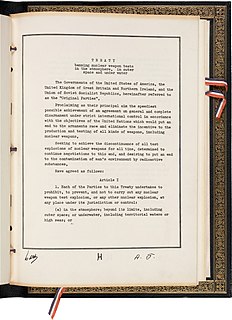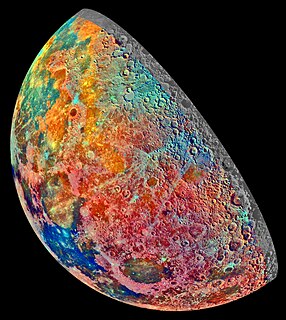
The Outer Space Treaty, formally the Treaty on Principles Governing the Activities of States in the Exploration and Use of Outer Space, including the Moon and Other Celestial Bodies, is a multilateral treaty that forms the basis of international space law. Negotiated and drafted under the auspices of the United Nations, it was opened for signature in the United States, the United Kingdom, and the Soviet Union on 27 January 1967, entering into force on 10 October 1967. As of February 2022, 112 countries are parties to the treaty—including all major spacefaring nations—and another 23 are signatories.

Kenneth Stanton Calvert is the U.S. representative for California's 42nd congressional district, and previously the 44th and 43rd, serving since 1993. He is a member of the Republican Party. The district is part of the Inland Empire of Southern California.

The Vision for Space Exploration (VSE) was a plan for space exploration announced on January 14, 2004 by President George W. Bush. It was conceived as a response to the Space Shuttle Columbia disaster, the state of human spaceflight at NASA, and as a way to regain public enthusiasm for space exploration.

Colonization of the Moon or Lunar settlement is a process, or concept employed by some proposals, for claiming robotic or human exploitation and settlement on the Moon.
The Agreement Governing the Activities of States on the Moon and Other Celestial Bodies, better known as the Moon Treaty or Moon Agreement, is a multilateral treaty that turns jurisdiction of all celestial bodies over to the participant countries. Thus, all activities would conform to international law, including the United Nations Charter.

Asteroid mining is the hypothetical exploitation of materials from asteroids and other minor planets, including near-Earth objects.

The National Aeronautics and Space Act of 1958 is the United States federal statute that created the National Aeronautics and Space Administration (NASA). The Act, which followed close on the heels of the Soviet Union's launch of Sputnik, was drafted by the United States House Select Committee on Astronautics and Space Exploration and on July 29, 1958 was signed by President Eisenhower. Prior to enactment, the responsibility for space exploration was deemed primarily a military venture, in line with the Soviet model that had launched the first orbital satellite. In large measure, the Act was prompted by the lack of response by a US military infrastructure that seemed incapable of keeping up the space race.

Commercial use of space is the provision of goods or services of commercial value by using equipment sent into Earth orbit or outer space. This phenomenon – aka Space Economy – is accelerating cross-sector innovation processes combining the most advanced space and digital technologies to develop a broad portfolio of space-based services. The use of space technologies and of the data they collect, combined with the most advanced enabling digital technologies is generating a multitude of business opportunities that include the development of new products and services all the way to the creation of new business models, and the reconfiguration of value networks and relationships between companies. If well leveraged such technology and business opportunities can contribute to the creation of tangible and intangible value, through new forms and sources of revenue, operating efficiency and the start of new projects leading to multidimensional positive impact. Examples of the commercial use of space include satellite navigation, satellite television and commercial satellite imagery. Operators of such services typically contract the manufacturing of satellites and their launch to private or public companies, which form an integral part of the space economy. Some commercial ventures have long-term plans to exploit natural resources originating outside Earth, for example asteroid mining. Space tourism, currently an exceptional activity, could also be an area of future growth, as new businesses strive to reduce the costs and risks of human spaceflight.
Space jurisdiction, a field addressing what countries can enforce various laws in space, has become more important as the private sector enters the field of space tourism. Under the Outer Space Treaty of 1967, while space and celestial bodies cannot be appropriated by nations, objects launched into space and personnel on board them remain under the jurisdiction of the state of registry.

The politics of outer space includes space treaties, law in space, international cooperation and conflict in space exploration, international economics and the hypothetical political impact of any contact with extraterrestrial intelligence.
Title 51 of the United States Code, entitled National and Commercial Space Programs, is the compilation of the general laws regarding space programs. It was promulgated by U.S. President Barack Obama on December 18, 2010 when he signed PL 111-314 into law.
The NASA Authorization Act of 2010 is a U.S. law authorizing NASA appropriations for fiscal years 2011, 2012, 2013 with the same top-line budget values as requested by US President Barack Obama. It resulted from the Augustine Commission's review of then-current crewed space flight plans.
Deep Space Industries, or DSI, was an American privately-held company operating in the space technology and space exploration sectors. It was acquired on January 1, 2019 by Bradford Space.

Commercial Space Launch Act of 1984 is a United States federal law authored to facilitate the private enterprise of the commercialization of space and space technology. The Act of Congress set forth the quest to acquire innovative equipment and services offered by entrepreneurial ventures from the information technology services, remote sensing technology, and telecommunications industries. The Act recognized the United States private sector as having the capability to develop commercial launch vehicles, orbital satellites, and operate private launch sites and services. The Act also assigned the duties of overseeing and coordinating commercial launches, issuing of licenses and permits, and promotion of safety standards to the Secretary of Department of Transportation.

The NASA Authorization Act of 2014 is a bill that would authorize the appropriation of $17.6 billion in fiscal year 2014 to the National Aeronautics and Space Administration (NASA). NASA would use the funding for human exploration of space, the Space Launch System, the Orion spacecraft, the Commercial Crew Program, the International Space Station (ISS), and various technological and educational projects.

The Harmful Algal Bloom and Hypoxia Research and Control Amendments Act of 2014 is a U.S. public law that reauthorizes and modifies the Harmful Algal Bloom and Hypoxia Research and Control Act of 1998 and would authorize the appropriation of $20.5 million annually through 2018 for the National Oceanic and Atmospheric Administration (NOAA) to mitigate the harmful effects of algal blooms and hypoxia.

The Commercial Space Launch Competitiveness Act, sometimes referred to as the Spurring Private Aerospace Competitiveness and Entrepreneurship (SPACE) Act of 2015, is an update of the United States Government of its commercial space use, legislated in 2015. The update to US law explicitly allows US citizens and industries to "engage in the commercial exploration and exploitation of space resources" including water and minerals. The right does not extend to extraterrestrial life, so anything that is alive may not be exploited commercially.

Resource Prospector is a cancelled mission concept by NASA of a rover that would have performed a survey expedition on a polar region of the Moon. The rover was to attempt to detect and map the location of volatiles such as hydrogen, oxygen and lunar water which could foster more affordable and sustainable human exploration to the Moon, Mars, and other Solar System bodies.

The Moon bears substantial natural resources which could be exploited in the future. Potential lunar resources may encompass processable materials such as volatiles and minerals, along with geologic structures such as lava tubes that together, might enable lunar habitation. The use of resources on the Moon may provide a means of reducing the cost and risk of lunar exploration and beyond.
Origin Space(Nanjing) Technology Co., Ltd. Origin Space is the first space technology enterprise in China dedicated to the exploration, development, and utilization of space resources. Focusing on the world's most cutting-edge space resources industry, the company takes data services as an entry point. It gradually expands to on-orbit servicing and commercial exploitation of space resources through university research missions, space object observation, space object database, and other businesses.









